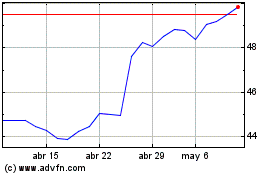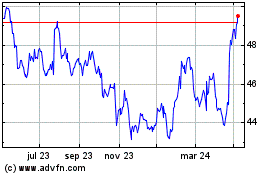Unilever Drops Plan to Consolidate in Netherlands Amid Shareholder Revolt -- 3rd Update
05 Octubre 2018 - 3:00AM
Noticias Dow Jones
By Adam Clark
LONDON -- Unilever PLC on Friday abandoned its plan to
consolidate its British and Dutch operating companies after facing
mounting opposition from some of its largest investors.
Under the plan, the maker of Hellmann's mayonnaise and Ben &
Jerry's ice cream would have ended its dual-listed structure and
ditched its London headquarters in favor of Rotterdam.
The reversal represents a surprise capitulation for departing
Chief Executive Paul Polman, who made the consolidation effort his
swan song at Unilever. After fending off an unsolicited bid from
American rival Kraft Heinz Co., Mr. Polman and the board embarked
on a strategic review that concluded a single structure would make
it more nimble.
However, in recent weeks a parade of big, institutional
investors publicly said they would oppose the plan at a shareholder
vote later this month, raising questions as to whether Unilever
could muster enough support.
On Friday, Unilever said it would withdraw the proposal after
recognizing it hadn't received support from a significant group of
shareholders.
The company had said that being a single entity would make it
easier to do deals and act quickly. But the move would have cost
the company its place in the U.K.'s FTSE 100, forcing some funds
that have specific mandates to sell.
Critics had argued that the plan's benefits weren't clear, that
there was uncertainty about Dutch dividend taxes and that the move
could have set a bad precedent as the U.K. readies to depart the
European Union.
Major investors, including Aviva, M&G, Legal & General,
Schroders, Lindsell Train, Columbia Threadneedle and Royal London
Asset Management -- who together own around 10% of Unilever -- all
said they planned to vote "no."
The proposal also angered some private shareholders, who stood
to have an outsize role in the vote because of a rule requiring a
"yes" vote from more than 50% of those voting no matter how big
their stake is. That would have given an owner or just one share
the same voice as a major investor.
Unilever had made a big push to win over shareholders in recent
weeks as public opposition mounted.
The company's chairman wrote an op-ed for a major British
newspaper, its finance chief appeared on a high-profile BBC radio
show and the company took out full-page adverts in the mainstream
press.
On Friday, the company said it still thought that simplifying
its structure would be best in the long term and that it would now
consider next steps and engage with shareholders. It also said it
would proceed with its plan to cancel its Dutch preference
shares.
Unilever has long operated as two separate listed entities --
Unilever PLC in the U.K. and Unilever NV in the Netherlands -- with
a group-wide set of managers and directors.
In March, it said it would unify the dual structure that dates
back to the 1929 merger of Lever Bros., an English soap maker, and
Margarine Unie, a Dutch margarine producer.
Unilever picked the Netherlands over the U.K. for its base
because it said the Dutch entity was bigger and that those shares
traded with greater liquidity. It said the move wasn't related to
Brexit.
--Saabira Chaudhuri contributed to this article.
(END) Dow Jones Newswires
October 05, 2018 03:45 ET (07:45 GMT)
Copyright (c) 2018 Dow Jones & Company, Inc.
Unilever (EU:UNA)
Gráfica de Acción Histórica
De Mar 2024 a Abr 2024

Unilever (EU:UNA)
Gráfica de Acción Histórica
De Abr 2023 a Abr 2024
